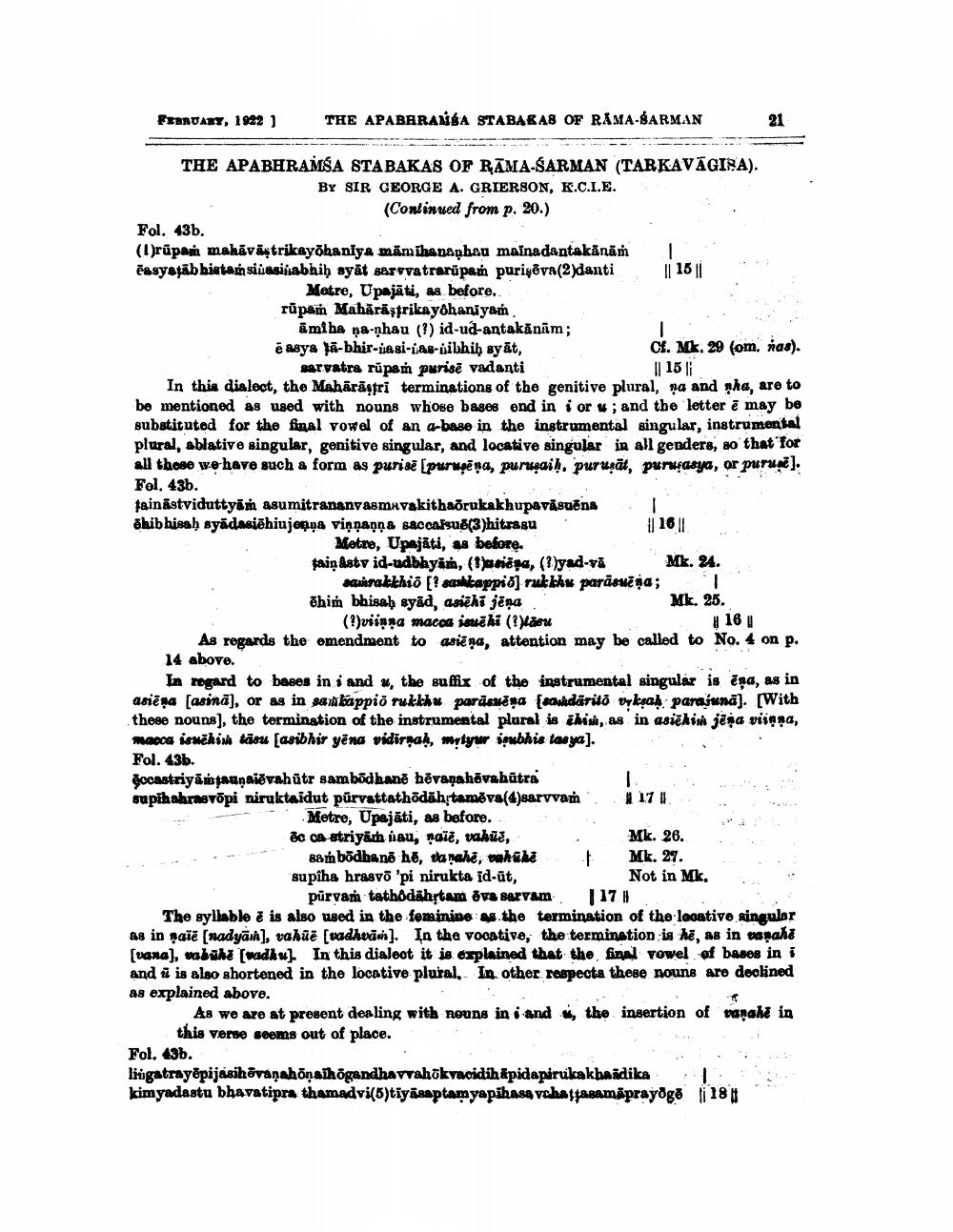________________
THE APABHRAMSA STABAKAS OF RAMA-SARMAN
FEBRUARY, 1922]
THE APABHRAMSA STABAKAS OF RAMA-SARMAN (TARKAVAGISA).
BY SIR GEORGE A. GRIERSON, K.C.I.E. (Continued from p. 20.)
Fol. 43b.
(1)rüpaṁ mahāvāştriksyöhaniya mamihanahau mainadantakānāṁ easyatabhistamsiuasinabhiḥ syat sarvvatrarupaṁ purişēva (2)danti Matre, Upajati, as before.. rupam Maharastrikayôhaniyam amiha na-nhau (?) id-ud-antakānām; easya la-bhir-uasi-ias-nibhiḥ syat, sarvatra rūpaṁ purisē vadanti
I
Cf. Mk. 29 (om. nas). 15||
In this dialect, the Maharastri terminations of the genitive plural, na and pha, are to be mentioned as used with nouns whose bases end in i or u; and the letter e may be substituted for the final vowel of an a-base in the instrumental singular, instrumental plural, ablative singular, genitive singular, and locative singular in all genders, so that for all these we have such a form as purisē [purusēņa, purusaiḥ, purusat, purusasya, or purusë]. Fol. 43b.
jaināstviduttyām asumitrananvasmavakithaōrukakhupavāsuēna shibhiash syādasiëhinjeņņa viṣṇagga saccalus(3)hitrasu
Metre, Upajati, as before. saistvid-udby, (1)uničṇa, (1)yad-vi
samrakkhiō [? sankappio] rukkku parāsuēņa; ehim bhisah syad, asiēhī jēņa
(?)viinna macca isuēki (?)āsu
||16||
|16||
Mk. 24.
T Mk. 25.
t
16
As regards the emendment to asiena, attention may be called to No. 4 on p. 14 above.
In regard to bases in i and x, the suffix of the instrumental singular is ēna, as in asična [arinā], or as in aaaappio rukkhu parāēņa (saudário vykṇaḥ parajumd]. [With these nouns], the termination of the instrumental plural is this, as in asiekim jena viinna, macca isučkim tāsu [asibhir yēna vidirṇaḥ, mytyur iṣubhis tasya].
Fol. 43b.
gocastriyamjaunaiēvahütr sambodhanë hëvaṇahëvahūtra supihakrasvōpi niruktaidut parvattathōdähṛtamva(4)sarvvaṁ
Metre, Upajati, as before. oc ca striyamh iau, ņaïē, vakūē,
sambodhanë hë, vaṇahē, vahukē supîha hrasvo 'pi nirukta id-ūt, purvam tathodahṛtam öva sarvam
17 8
The syllable é is also used in the feminine as the termination of the locative singular as in ṇaïë [nadyām], vahūë [vadhvām]. In the vocative, the termination is he, as in vaṇahë [vana], vabuke [vadhu]. In this dialect it is explained that the final vowel of bases in i and u is also shortened in the locative plural. In other respects these nouns are declined as explained above.
21
#17 #.
Mk. 26.
Mk. 27.
Not in Mk.
As we are at present dealing with nouns in i and, the insertion of vaṇahë in this verse seems out of place.
Fol. 43b.
ligatrayēpijasihövaṇahöṇalhögandhavvahōkvacidih#pidapirukakhaidika kimyndastu bhavatipra thamadvi(5)tiysaptam yapihasa vohaijaaamaprayogë
1
18




